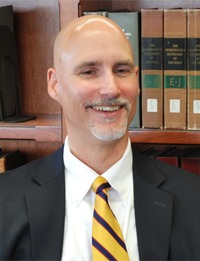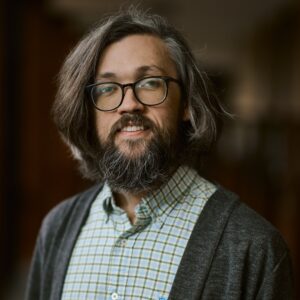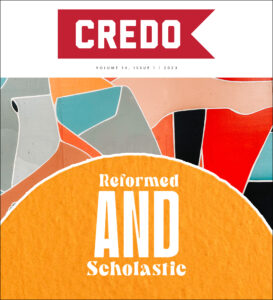Dr. R. Scott Clark (DPhil Oxford University) is a historical theologian who has taught at Wheaton College, Reformed Theological Seminary, Jackson, Concordia University, Irvine, and Westminster Seminary California. He is the author of several books including Recovering the Reformed Confession: Our Theology, Piety, and Practice and Caspar Olevian and the Substance of the Covenant: The Double Benefit of Christ. Additionally, he and Carl Trueman co-edited Protestant Scholasticism: Essays in Reassessment. In this interview with Credo’s executive editor Timothy Gatewood, Clark discusses the Reformed scholastics, the benefit they offer the modern church, as well as help to correct some popular misconceptions about the Reformed tradition.
___________________________________________________________________________________
Who are the Reformed Scholastics? Is there any difference between the Reformed Scholastics and the Reformed Orthodox?
Strictly speaking, the Reformed scholastics were academic theologians, i.e., those who taught theology in the classroom and who wrote theology in an academic context. Reformed orthodoxy is a broader category, which includes the academic theologians but also includes those who had been educated in a theology faculty or who were influenced by academic theologians. The line between them can be fuzzy since many of the theologians were also preachers and moved between the academy and the church or continued preaching while they were also lecturing in a university or a theological school.
Scholarship concerning the Reformation and the Reformed scholastics has grown significantly over the last few decades. What is one area of research, whether an author or a particularly Reformed idea, that still needs to be retrieved?
We have a reasonably good idea of the systematic theology and even the covenant theology of most of the major figures in Reformed orthodoxy but we do not have a sufficiently clear picture of their use of Scripture. Because only a tiny fraction of their biblical commentaries and biblical studies monographs we have an incomplete picture of how closely and carefully they worked with Scripture.
How would you describe the relationship between the Reformers and the Reformed Scholastics? Is there continuity between the medieval scholastics, the Reformers, and the Reformed Scholastics?
I like to speak of the magisterial Protestants (e.g., Luther, Melanchthon, Zwingli, Bucer, and Calvin) and their orthodox successors. There were areas of strong continuity and areas of development. The Reformed orthodox saw themselves as carrying on the great achievements of the pioneering Protestant theologians. The Reformed orthodox saw themselves as carrying on the great achievements of the pioneering Protestant theologians. Click To Tweet They spoke and thought of Calvin and Luther as “our” theologians. It was a Reformed orthodox theologian, J. H. Alsted, who, in 1618, called the doctrine of justification “the article of the standing or falling of the church.” The orthodox stoutly defended sola Scriptura and salvation sola gratia. By the early 17th century, however, the Reformed orthodox faced a much more sophisticated critique of the Reformation from Roman Catholic scholars. In turn they had to engage more carefully and fully with the fathers and the great medieval scholastic theologians than the magisterial theologians were able to do. They had to answer questions that were not faced by the sixteenth-century Protestants and by the middle of the century they were also facing the early stages of the Enlightenment, which posed challenges that the earlier Reformers did not face, at least not in the same way.
The Patristic period and 20th century Evangelicalism may receive their fair share of attention in the typical Christian History course, but students may not receive the same amount of instruction on the medieval or Reformed Scholastics. What does one lose if he overlooks the Reformed scholastics? What is a unique theological contribution made by the Reformed Scholastics that may not be clearly articulated elsewhere?
There are programs where, because of the limited hours allotted to history, faculty are forced to compress church history and the history of theology to the greatest hits. That is unfortunate because those gaps include some of the most important periods, arguments, and events in the history of the church. It is impossible to understand the Reformation without having a reasonably good grasp of the nature and development of the Western church in the millennium preceding it. Against what was Luther rebelling and why? The fruit of inadequate grasp of medieval theology, piety, and practice is all around us. Had the advocates any serious encounter with the Middle Ages they might realize that significant portions of their program are not new at all. The Reformation development of the doctrine of vocation can only be understood against the background of the monastic movements and the rise of sacerdotalism. Without a grasp of the middle ages, the Reformation tends to become caricature and it makes us more susceptible to ill-grounded revisions of the Reformation. Without a grasp of the orthodox successors of the Reformation, for those of us who regard ourselves in that tradition, we lose our vocabulary, significant portions of our theology and piety, and the rationale for our practice. Click To Tweet
Without a grasp of the orthodox successors of the Reformation, for those of us who regard ourselves in that tradition, we lose our vocabulary, significant portions of our theology and piety, and the rationale for our practice. One of the things I learned from reading Richard Muller, who pointed me to Franciscus Junius (1545–1602), was the way the Reformed orthodox gave us fundamental categories for teaching of theology. We know that Calvin and the Reformed distinguished between the Creator and the creature, but Junius gave us a way of applying that to theological method. According to Junius, in this life we do what he called “pilgrim theology.” That is enormously significant. It means that we are not the creators of theology but its recipients. We are not God but his analogs. Had scholars understood this earlier they might have saved a lot of time and ink by over the alleged rationalism of Reformed orthodoxy.
You’ve written a good deal about a lesser-known Reformed Scholastic – Caspar Olevianus. Who is he, how did you discover him, and why has he maintained your interest?
Olevianus still interests me because I keep learning from him. He was a humanist, but he studied Reformed theology just as Reformed orthodoxy was beginning. He worked among a cadre of other Reformed theologians in Heidelberg for fifteen years and then helped to advance the Reformed Reformation beyond the Palatinate. Were he writing today, we might call him a biblical theologian because of his interest in the sweep of the history of redemption but he was also very much a churchly theologian. He wrote the simplest catechism possible, for German farmers and he wrote commentaries on the Apostles Creed and worked for the Reformation of the church in his hometown and elsewhere. He was not a pure academic. He was superintendent of the church in Heidelberg, and he preached regularly but he also wrote biblical commentaries and a large covenant or biblical theology that contains truly profound insights.
Some who disagree with aspects of Reformed scholasticism have cited the need for perpetual theological reformation, sometimes citing the phrase ecclesia reformata, semper reformanda (the church reformed, always reforming). Is this a proper understanding of that phrase and how should one properly respect history without compromising sola scriptura?
Ecclesia Reformata, semper reformanda might be both one of the most abused and overworked slogans of the last 60 years. Ecclesia Reformata, semper reformanda might be both one of the most abused and overworked slogans of the last 60 years. Click To Tweet There was a group of Reformed theologians in the Netherlands, part of the Nadere Reformatie movement, who used expressions like this, but it is almost certain that the Princeton professor Edward Dowey (1918–2003) is the proximate source of this expression. He was influenced by Karl Barth (1886–1968), who used variations of the expression.
When the seventeenth century Dutch Reformed writers spoke this way, they intended to say that because of sin, we are prone to corrupt our theology, piety, and practice and it needs to be brought back to the plumb line of the Word of God as confessed by the churches. It certainly did not mean, as it is often assumed today, “The old Protestants got some things right but there is a good deal that needs to be fixed.” It is almost always the case that those proposing to fix it are just the ones we should not have revising the Reformation.
Some have argued that the Reformed scholastics were overly committed to Aristotelian philosophy. Were the Reformed scholastics exegetes? How did they understand the relationship between theology, philosophy, and exegesis?
In my experience those who say such things have little experience either with Aristotle or Reformed orthodoxy. One gets the impression that for some folk, the mere appearance of a syllogism is cause for suspicion of rationalism. Of course, Charles Augustus Briggs (1841–1913) made that very claim, that the Reformed orthodox traded in biblical and creedal theology for a kind of Aristotle-infested rationalism. Nothing could be further from the truth.
First, the insinuation rests on a syllogism: 1) the use of Aristotle is evidence of rationalism; 2) the orthodox used Aristotle; 3) ergo the Reformed orthodox were rationalist. There is no question whether they used Aristotle. The question is how? I find that they were quite intent in their use of aspects of Aristotle’s Organon, which had been a textbook used by Christians for most of a millennium. They saw him as a good guide to nature but not as a guide to grace. Beginning logic students still study Aristotle (whether or not they know it) in first semester logic courses. By the time of Reformed orthodoxy Christians had been appropriating Aristotle’s categories and forms of argumentation for a very long time without being taken captive by his philosophy.
The Reformed were indeed biblical exegetes. They published voluminous commentaries and monographs on Scripture. It is not their fault that, in the mid-twentieth century, American schools gave up teaching Latin so that we are too ignorant to read their work. They were not only biblical exegetes, but they were scholars of the Ancient Near East. I think a good number of modern evangelical Biblical scholars might be surprised to learn that what they think of as modern breakthroughs in biblical studies were actually first made by orthodox Reformed scholars in the seventeenth century.
They thought of reason as having a strictly ministerial role. It was the Enlightenment project that gave to reason a magisterial rule. The orthodox were explicit about that. The great Dutch theologian Gijsbertus Voetius (1589–1576) battled Descartes tooth and nail to defend the primacy of Scripture over reason. The writers facing the rising tide of what would become the Enlightenment began, by the early 18th century, to talk more about reason and to try to make clear that Reformed theology was not irrational, but they intended to preserve the supremacy of Scripture over human reason.
If our readers desire a deeper understanding of the Protestant Scholastics, where should they turn?
The best one-volume introduction to Reformed orthodoxy is Willem van Asselt, ed. Introduction to Reformed Scholasticism, Reformed Historical-Theological Studies (Grand Rapids: Reformation Heritage Books, 2011).
After that students should head directly to Richard Muller’s magisterial work, Post-Reformation Reformed Dogmatics, 2nd ed. 4 vol. (Grand Rapids: Baker, 2003).
There are several essays in Carl Trueman and R. Scott Clark, ed. Protestant Scholasticism: Essays in Reassessment (Carlisle, UK: Paternoster, 1999) that are still helpful.
Reformed scholasticism was focussed on teaching in the academy but were they also concerned about local churches? Should the average churchgoer tackle the scholastics, or should they focus their attention elsewhere? Should pastors “democratize” the thought of the Protestant scholastics for their congregations?
I would be disappointed if my students were not working to digest and communicate to their congregations the insights gained by the Reformed orthodox. Their work was never meant to remain in the academy. They did what they did usually in the course of preparing men for pastoral ministry or in the conduct of the ministry. Click To Tweet Their work was never meant to remain in the academy. They did what they did usually in the course of preparing men for pastoral ministry or in the conduct of the ministry. They were not doing battle in the academy merely for the sake of doing battle. Average church goers should be reading Perkins, Wollebius, Ursinus, Martyr, Rollock, and even Owen.
You wrote a post for Credo entitled “Why I Changed My Mind About Thomas Aquinas.” How do you parse the Thomistic leanings of the Reformed scholastics? Is it appropriate to call the Reformed scholastics “Thomists”?
This is an interesting question, and it is a live question for me. I have been working on a commentary on the Heidelberg Catechism and I have had to re-think what I want to say about Thomas and how the Reformed appropriated him and responded to him. Yes, there were certainly Thomists among the Reformed orthodox. That does not mean that they agreed with Thomas on everything, but it does mean that they were influenced by his method, by his analysis of some important questions, and they found his language helpful. Two most obvious examples, as I noted in that article, would be Girolamo Zanchi (1516–90) and Peter Martyr Vermigli (1499–1562) but the list could be much longer.
You are the co-editor of a recently released book evaluating and expositing the doctrine of justification in three Reformed authors: Theodore Beza, Amandus Polanus, and Francis Turretin. Why did you focus on these three in particular? Is there a difference between a Reformed scholastic definition of justification and the Reformers’ understanding of justification?
Yes, there were certainly Thomists among the Reformed orthodox. Click To Tweet Beza, Polanus, and Turretin are three important voices in the history Reformed theology. Two of them are unfairly neglected. Beza’s importance to Reformed theology is hardly understood. He continued teaching theological (seminary) students for decades after Calvin. Scholars of Beza have focused on his political theology (e.g., his resistance theory), his view of the Supper, his doctrine of the divine decree but there has been little work done on his soteriology. Nothing was more important to him than the doctrine of justification sola fide.
Polanus was a major theologian in the early 17 century and his Syntagma was a major and influential summary of Reformed theology. Unfortunately, because it remains untranslated it is lost to most people, so we wanted to take a snapshot to see how a mainstream, Reformed system in the early 17th century was handling the doctrine of justification.
Turretin, of course, is well known but his disputations are less well known. This disputation, on the agreement of James and Paul on justification, is interesting for both historical and theological reasons. First, it gives us an idea of where the mainstream of Reformed orthodoxy was, on justification, in the late 17th century. Second, it is interesting to see him defending the Reformation on this point by reconciling James and Paul. Third, modern evangelical biblical and systematic theologians might want to take note of how he addressed this question since it seems fashionable, in some quarters, either to set James and Paul against one another or to use the question to revise the Reformation consensus on justification.



